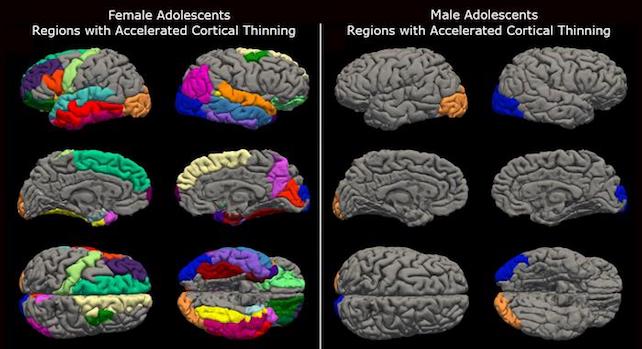The devastation of the COVID-19 pandemic may have left a significant mark on our brains, even if we didn't get sick.
Fatal cases of COVID-19 look scarily like old age in the brain, and now, new research suggests that the mental, social, and financial stresses of the pandemic may have aged our brains as well.
A team led by researchers at the University of Nottingham trained an AI model to recognize healthy aging in the brain, using the data of more than 15,000 adults in the UK Biobank.
The algorithm was then used to analyze the brain ages of two groups: one that had brain scans taken before the pandemic and another that had brain scans taken both before and during the pandemic.
Related: Your Brain's Youthfulness (or Lack of It) Could Predict How Long You Live
During the pandemic, the average human brain aged five and a half months faster than it did before 2020.
"What surprised me most was that even people who hadn't had COVID showed significant increases in brain aging rates," says neurologist Ali-Reza Mohammadi-Nejad from Nottingham, who led the study.
"It really shows how much the experience of the pandemic itself, everything from isolation to uncertainty, may have affected our brain health."
The good news is that those changes may be reversible. The study only analyzed brain scans from two time points, which means that there may have been neurological recovery in the years that followed.
"We can't yet test whether the changes we saw will reverse, but it's certainly possible, and that's an encouraging thought," says neurologist Dorothee Auer from Nottingham.
What's more, just because a person's brain may have aged at a faster rate during the pandemic, doesn't mean their cognitive function was necessarily impacted. In fact, the only individuals in the study who showed decreased cognitive performance were those who were directly infected with the SARS-CoV-2 virus.
Still, the findings suggest that a major life event like a pandemic can have a significant impact on the brain, even if you don't get sick.
In the first few years of the global pandemic, millions of humans died, and billions more dealt with a tidal wave of grief, loneliness, depression, anxiety, financial stress, and sleep disturbances.
Initial research found teenagers were particularly affected by the global crisis, with the adolescent brain showing concerning signs of accelerated aging after 2020, similar to teens experiencing violence, neglect, or family dysfunction.

The brains of young girls showed especially pronounced thinning in the cortex, which is a brain region primarily composed of gray matter. But the current study among adults found that male brains were more vulnerable to both grey and white matter changes.
Signs of accelerated aging were also particularly evident among older people and among socially or economically disadvantaged groups.
Previous studies have found that social isolation can change the structure of the brain, and poverty is also linked to accelerated brain aging.
Both could be factors leading to structural changes in the brain, but it's important to remain cautious.
Sweeping, long-term studies using brain scans can provide scientists with useful clues as to how major life events, like birth, parenthood, or menstruation, might be impacting our central nervous systems.
But without closer research, it's impossible to say why these brain regions are changing, or what impact the changes might have on cognitive function, or our behavior.
"This study reminds us that brain health is shaped not only by illness, but by our everyday environment," concludes Auer.
"The pandemic put a strain on people's lives, especially those already facing disadvantage."
The study was published in Nature Communications.
